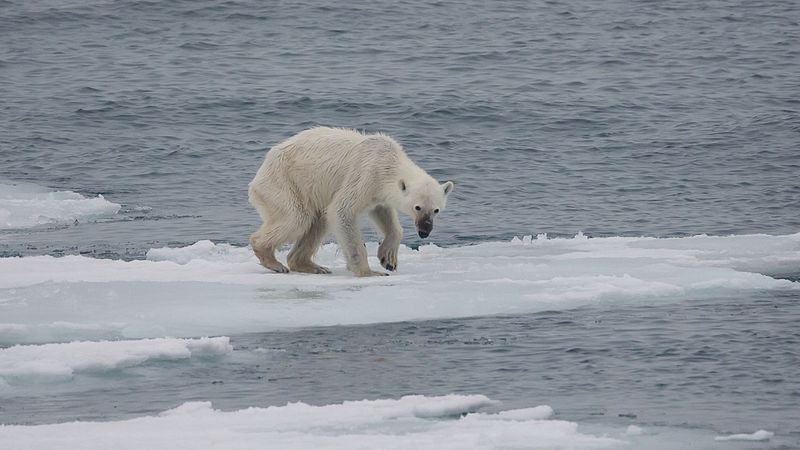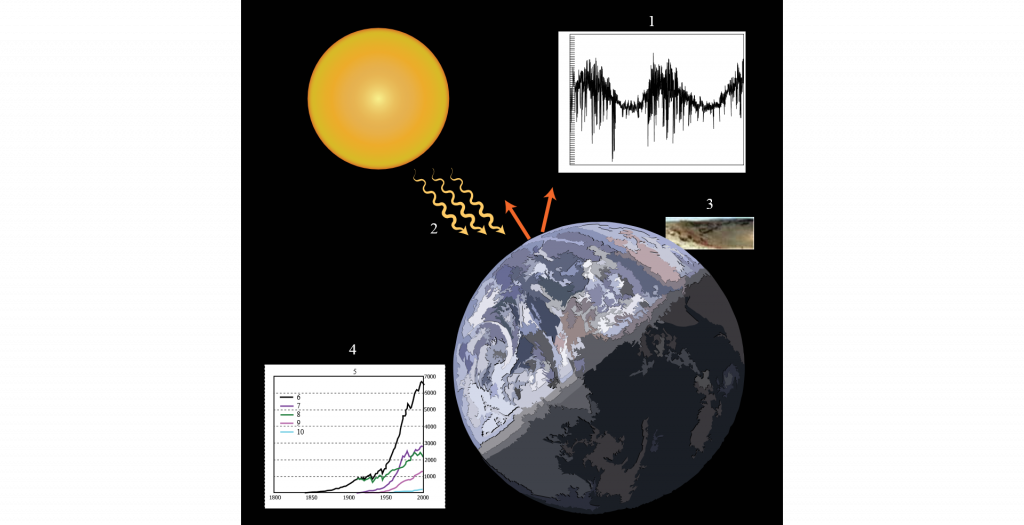By Jennifer Ballou | Observer Contributor

Andreas Weith; https://commons.wikimedia.org/wiki/File:Endangered_arctic_-_starving_polar_bear.jpg
Picture a cup of water. Now imagine that cup overflowing. It would be quite disastrous, wouldn’t it? Nowhere for that excess water to go, just continuously causing a mess and damaging what is around it.
This is how physics Professor Nathanael Fortune of Smith College wants people to view the world. Fortune recently gave a speech about the science and basics of climate change to the North Quabbin Energy group at the Millers River Environmental Center in Athol. He explains his analogy, stating that “our earth is that cup and we are filling our atmosphere with carbon dioxide two times faster than it can remove it.”
This imbalance causes increase in temperatures, which in turn causes ice caps to melt and leads to rising ocean levels. The increase of carbon dioxide in our atmosphere also creates changes in weather patterns, which attributes itself to severe droughts in one area and flooding in others. Many other people and organizations in Massachusetts are worried about these changes as well.
Fortune wanted the listeners to walk away from the speech and share the information with friends and enemies alike “because we need everyone on board.” He believes that we may be “starting too late,” but encourages everyone to do everything in their power to change what they’re doing now that could be causing damage and carbon dioxide pollution.

Medium69; https://commons.wikimedia.org/wiki/File:Climate_change_numbered.svg
“Carbon dioxide parts per million keep rising in our atmosphere,” said Fortune. “In 20 to 25 years it could reach the warmest it’s ever been in our 200,000-year civilization. Will our planet survive? Sure. But will we? We are subjecting future generations to a system we cannot reverse.”
The 25-year range seems to be the most commonly used when talking about climate change. Former Senator Stephen Brewer, special assistant to the president at MWCC, is an active member of the East Quabbin Land Trust, which recently hosted a retreat. During this, there was a discussion on climate change, specifically to our state and how it will affect us in the coming years.
“Scientists say that on an average, we see 3 to 5 days of summer in the 90-degree range. They’re predicting that in 25 years, we could see upwards of 60 or more days of temperatures above 90,” said Brewer. He continued on to explain the implications of this increase. “People in the urban, city areas where there’s no shade, no trees, they’re going to be looking for cooler places to live. This is where they’re going to look, inland, in Central and Western Mass.”
Brewer believes areas that are now protected from being developed could one day be cut down to make way for housing for people trying to escape the extreme heat. “There are laws protecting those areas, but those same men and women can change those laws,” said Brewer.
Another issue that Brewer spoke about was with temperatures increasing, it is creating an environment for pests and diseases that have only affected plants in the south, to migrate north. “The Asian long horn beetle is one pest we now see here, and Worcester had to spend about $35 million to cut down the dead, diseased trees,” said Brewer. “We could spray the trees to prevent the pests, but that kills the tree as well, and it’s impractical for whole forests.”
Tower Hill Botanic Garden in Boylston is another local area that is seeing the effects of climate change and new species of pests and diseases. Robert Burgess, the garden’s public relations manager, must stay on top of everything happening not just at Tower Hill itself, but in the surrounding areas. It is important to know what is happening with the local vegetation and what issues might arise.
One major problem that did occur affected the apple orchard which contains heirloom trees dating back to the 1700’s.
“Southern diseases are coming up, ones that love the warm temperatures,” said Burgess. “The orchard was affected about five years ago with a blight that’s not native here. It shrivels the branches and the leaves, and makes the fruits inedible. We had to call in special arborists that pruned the trees to help stop the spread, injected medicine into the roots, and you just have to hope that helps.” This disease has put a hindrance on Tower Hill’s annual fall festivities, since they cannot have visitors eating the apples there. They have had order apples from local farms to carry on with traditions.
One thing that Fortune, Brewer, and Burgess all stated, was that change needs to happen, and it needs to happen now. Time is short when it comes to saving our planet and it’s atmosphere. They believe that there are many energy efficient changes that everyone can make, starting with evaluating how we use energy. The younger generations are the ones most at stake, but many believe that they can be the most prominent change.
Natural Resources student, Bailey Fluet, is the acting president for the Green Society on campus. She shared the ideas and ways that the Society and greenhouse help to combat climate changes. “The biggest thing is informing people and making them open their eyes,” Fluet said. Between growing plants for use at the school and teaching people how to use plants and compost, it can cut down on a lot of waste. The Society recently held an Earth Day celebration where they distributed seed packets and taught students and visitors the importance of plants and the earth.
“The Green Society pushed for the refillable water stations at the new fountains, and it’s great to see people using them,” said Fluet. Recycling is one of the ways that Brewer and Burgess also believe can greatly benefit our planet. The new greenhouse will also feature a more efficient water system and energy efficient lighting, ideas that Fortune spoke on.
One thing that they all agree upon is that if change is to happen, it needs to happen now and it can start in the simplest of ways.
Comments are closed.